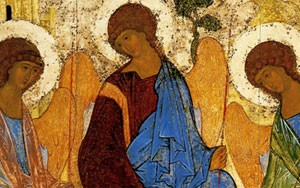


Theology
The main Doctrines of the Church
The Malankara Orthodox Church has pillars of Mystery through which it teaches and demonstrates its basic religious belief. They are called pillars due to the fact that they support and strengthen the faithful in their life as a pillar supports a roof. These pillars have Biblical foundation.
Scripture and Tradition
What is Holy Scripture?
The Holy Scripture is the sacred book that reveals the divine plan of Salvation in Jesus, which God the Father has began in the Old Testament times. The Holy Scripture relates the history of salvation revealed to Israel (OT) and the church (NT) for the benefit of the whole humanity.
The OT and NT are Holy Scripture. The OT predicted and expected a saviour, the Messiah in the fullness of time. In the incarnation of Jesus, the prediction of OT, one part of the Holy Scripture was fulfilled. This fulfilment was recorded and preserved in literary form, which is the NT.
Why the Holy Scripture?
Thus, since the NT reveals the God through Jesus Christ, the Bible is a holy scripture. According to the church, God inspires the Holy Scripture. Therefore, the scripture is true, Sacred and infallible and normative. In this sense, the Holy Scripture is a divine book.
Divine inspiration of the scripture
The divine inspiration is uttered in the Bible as St. Peter, the chief of the apostle says “First of all you must understand this, that no prophesy or scripture is a matter of ones own interpretation, because no prophesy ever come by human will, but men and women moved by Holy Spirit spoke from God” (II Pt. 1:20-21).
The formation of OT and NT
The formation of both OT and NT has a long history. The primitive church realised the OT as divinely inspired and the church need the same for expectation of Jesus as the promised Messiah. The preaching in Acts testifies to this fact. This means that NT is the image vision of the shadow in OT.
The NT scripture continues variety of scripture as gospels, narration of apostles acts, letters, apocalypse, church orders etc. The Christian community was in essence not a “bookish” one. It was called into existence by a series of events well remembered. The church made use of the OT scripture for the benefit of the Christian community. The apostle Paul says, “All scripture is inspired by God and is useful for teaching, for reproof, for correction and for training in righteousness, so that everyone who belongs to God may be proficient, equipped for every good work”.
Hence, Holy Scripture is a development within the living community, that is, the church. The community is the apostolic community. They had used the OT to explain the holy tradition to explain Jesus. Likewise, we rely on the apostolic teaching and their tradition. The church’s way of outlook is cyclic and hence the tradition comes within the church and not from any outside source. When we gather everything in its integrity, we understand that church itself is the tradition.
Tradition and Traditions
Tradition is, to be exact, a bond between the present and the past. The Greek word used is “parodosis” means to handing down, or to hand over, deliver. Since it is a bond, there could be certainly a relation within the church – a cyclic one. Apostolic teachings are there which substantiate the concept of tradition and its need in the church.
II Thes. 2:15 says “So then brothers and sisters stand firm and hold fast to the traditions that you were taught by us, either by word of mouth or by our letter”.
Hence, tradition includes tradition of mouth also. The advices by words that were observed by the posterity may not be found in the Holy Scripture. This does not mean that the Holy Scripture is imperfect. It is perfect in itself, but the church has the responsibility to observe and hand over the tradition in the church.
However, in traditions, all minute observances and ceremonies may arise. There could be certain factors that are set apart. Tradition include all traditions, but the tradition may not include tradition in its integrity, what Paul meant in Thes 2:15 and in II Cor 11:2 about ‘traditions’ is its integral aspect, that is, the church itself. It is within this ‘tradition’, all “traditions” (in its integral aspect) that the Holy Scripture was formulated and not the Holy Scripture formed the church. Behind every literal works, there lies an oral or written tradition.
The ‘rabbis’ in the NT made distinction between written Torah and oral tradition. The NT designates this unwritten tradition as the “tradition of elders” (Mt. 15:2). Paul’s expression “the tradition of my fathers” (Gal. 1:14) refers to both written and unwritten. Again “the custom of our fathers” (Acts 28:17; 6:14; 15:1; 21:21) and “the law of our fathers” (Acts 23:3) have the same meaning.
Our church gives equal importance to both the Holy Scripture and the tradition. The church believes that it is dangerous and wrong to give too much importance to any one of their neglecting concerns for other.